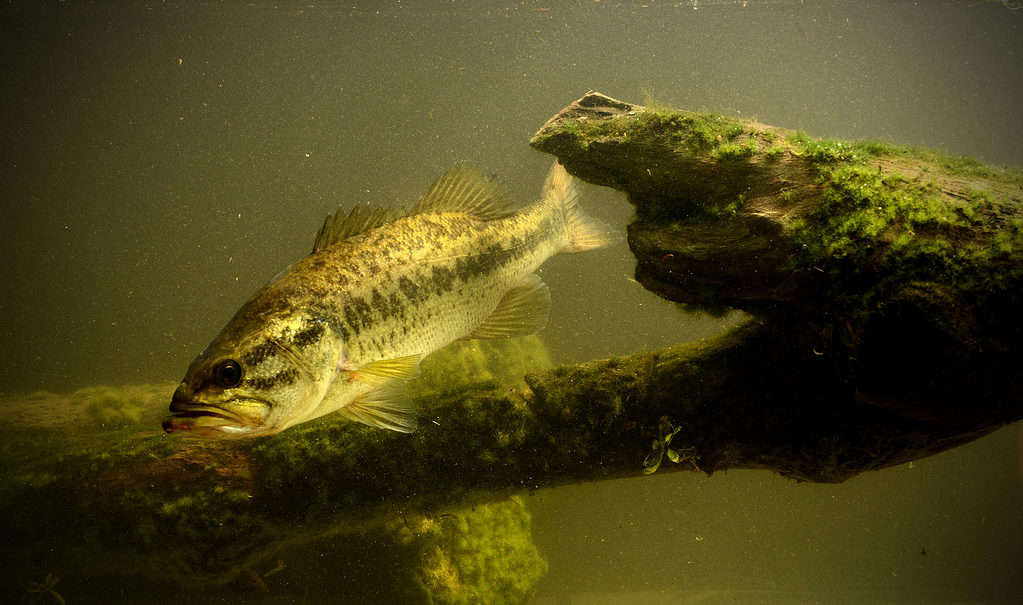The largemouth bass is one of the most unique and impressive game fish in North America. Bass fishing is especially popular in southeastern states in the US like Kentucky, where the area’s year-round mild climate and clear waters create the perfect habitat for fish like the largemouth bass and its related species. But what is the largest largemouth bass ever caught in Kentucky? Who caught it, and where did they find it? Does it come close to beating the current world record? Let’s take a closer look and learn more below.
All About the Largemouth Bass
©iStock.com/stammphoto
The largemouth bass’ taxonomic classification is Micropterus salmoides. This makes it one of 13 total species that fall under the Micropterus genus. These fish are better known simply as the black basses. Most black bass species are a dull, olive green color with brown markings and grow to around 16 to 24 inches long, with the largemouth being both the longest and heaviest of the group by far. Like other ray-finned fishes, their fins are held up by lots of thin, bony rods.
Broadly speaking, the black basses collectively make up one of eight total genera within the Centrarchidae family of sunfishes. There are around 38 total species in the Centrarchidae family, meaning black basses make up around a third of this entire family of fish! Other notable Micropterus species include the smallmouth, redeye, spotted, and Florida basses.
All Micropterus species, including the largemouth bass, are native to North America. They are exceptionally hardy and have a wide native range. They can be found as far north as southern Canada and as far south as northeastern Mexico. Notably, the largemouth has also been introduced to other parts of the world, such as east Asia and southwest Europe’s Iberian Peninsula.
While all black bass species are popular game fish, the largemouth is generally held in the highest regard by anglers. This is due to its wide range, large size, and feisty, aggressive behavior when hooked, making it an easily accessible but also very challenging and rewarding catch.


A Brief Overview of Largemouth Bass Fishing
Modern bass fishing has existed in North America at least since the 1800s. Early on, the ideal method for catching largemouth bass and other black basses was fly fishing. Artificial fly lures were originally modified from flies used to catch fish like trout and salmon. Over time, though, methods became more tailored to black basses specifically. Wooden lures were also popular, albeit for a short time until the development of plastic lures in the mid-20th century.
As fishing methods became more refined, the largemouth bass’ range also expanded. This is largely thanks to the development of the steam engine and more extensive railways in the United States. By the late 1800s, entire towns had sprung up around “tank ponds” established to supply water to steam engines. These tank ponds were commonly stocked with large and smallmouth basses.
By the time the 1900s rolled around, methods used for catching black basses were becoming more refined than ever. As mentioned briefly above, the plastic worm lure became the primary method for catching largemouth bass. Tournaments were developed for anglers to test their skills, such as the B.A.S.S. Federation’s first tournament in 1967 and the Bassmaster Classic in 1971.
Today, bass fishing has grown to a multi-billion dollar industry. The largemouth bass remains the most popular and prized of the black basses, though all 13 Micropterus species now have their own place within the hobby.
How Big Do Largemouth Bass Get?
The largemouth bass is not only the largest of all the black basses–it’s also the largest of all 38 total species in the Centrarchidae family of sunfishes! Although most largemouth bass reaches around 12 to 15 inches long, they are capable of reaching close to 3 feet in length. They’re also impressive when it comes to their overall weight, with most specimens weighing 10 to 12 pounds and especially heavy individuals exceeding 15 pounds.
Like many species, the largemouth bass is highly sexually dimorphic. This simply means males and females are visually distinct, most notably when it comes to their size. Females are larger and heavier than males on average. This is because very large females are usually prolific breeders that support the species’ population. This is also why catch-and-release fishing is encouraged among anglers.
Due to its massive size, strong, muscular body, and aggressive behavior when hooked, the largemouth bass has long remained one of the most popular game fish not just in North America but worldwide.
What is the Largest Largemouth Bass Ever Caught in Kentucky?

©iStock.com/FtLaudGirl
According to Kentucky’s state records, the largest largemouth bass ever caught in the Bluegrass State was 14 pounds and 9.5 ounces! It also measured 26.8 inches long. It was caught on April 19th, 2019, by Mark Ward of Evarts, Kentucky. He managed to break a previous state record set back in 1984–around 35 years ago at the time–by angler Dale Wilson. Wilson’s previous record was a 13-pound, 10-inch largemouth bass caught at Laurel County’s Wood Creek Lake.
In an interview with Ward days after the catch, he claimed he used a 6-inch junebug-colored lizard to reel in the record-breaking bass. Although it had rained all day, it cleared up shortly after he got off work and headed to Harlan County’s Highsplint Lake with his wife and daughter.
Despite the lake being somewhat murky from the previous rain, Ward noticed a 4-pound bass near the water’s surface. Soon after, with his very first cast that day, he reeled in the 14-plus-pound bass. Kentucky’s eastern fisheries district coordinator even noted the fish had such massive eyes due to its large size that it would “look like a shark” in the water.
Both the fishery’s district coordinator and Ward himself noted the fish was also incredibly girthy at 22.5 inches!
What is the Largest Largemouth Bass Ever Caught?
While Mark Ward’s record-breaking bass is certainly a whopper at over 14 pounds, the largest largemouth bass ever caught in Kentucky is still almost 8 pounds shy of the current world record. That title is held by angler Manabu Kurita of Aichi, Japan.
On July 2nd, 2009, Kurita reeled in an astonishing 22-pound, 5-ounce largemouth bass at Japan’s Lake Biwa. At the time, Kurita was 32 years old. Lake Biwa is the largest freshwater lake in Japan and is located in the Shiga Prefecture northeast of Kyoto. It’s also a key fishing spot in the area thanks to its incredibly biodiverse and healthy fish population.
Even though the largemouth bass is native to North America, it was introduced to other countries like Japan and parts of Europe starting in the 1920s. Populations soon exploded over the coming decades due to the largemouth’s incredibly hardy nature and tendency to hunt and overeat native fish species. Today, the species is largely considered to be invasive, and catching and eating them is encouraged in areas where they have established invasive populations.
Kurita’s 22-pound, 5-ounce bass actually surpassed a world record that had been held for 77 years. The previous record holder was George W. Perry, of Rentz, Georgia. Perry caught a 22-pound, 4-ounce largemouth bass in 1932 at Montgomery Lake in Telfair County, Georgia. He was only 19 years old at the time.
However, because the two fish are only around an ounce apart, the two anglers technically share the world record! This is due to an IGFA regulation that states record-breaking catches must be at least two ounces larger than the previous record.
Up Next:
Credit: Source link































